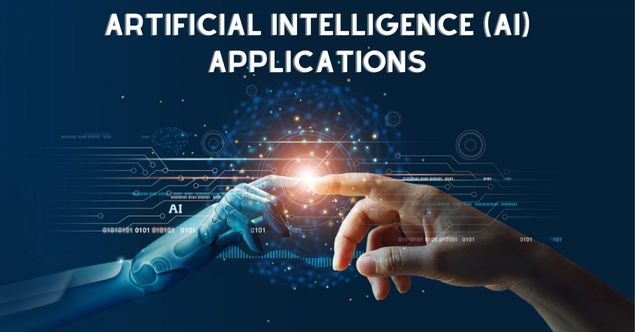There has been an exponential increase in AI development over the last decade. From self-driving cars and voice activated assistants to virtual reality, artificial intelligence has permeated every aspect of our lives.
The term Artificial Intelligence was coined in 1956, though it wasn't until the 1960s that computers were able to execute some of the rudimentary tasks. By the 1980s, however, AI had become much more sophisticated. Today, companies are investing heavily in AI technologies, believing they'll revolutionize their businesses.
Artificial intelligence is human intelligence processes by machines, especially computer systems that pretend to work like a human. Artificial Intelligence is a kind of technology designed to make calculated decisions. Specific applications of Artificial intelligence (AI) include expert systems, natural language processing, speech recognition and machine vision.
In other words, you can say Artificial Intelligence is an extensive field of computer science which aims at developing intelligent machines capable of doing activities that would normally require human intelligence. According to a survey by 2025, as many as 97 million people will work in the AI space.
Artificial Intelligence has become a huge part of our lives in recent years, from helping us with everyday tasks such as finding new recipes or recommending movies, to teaching us how to speak Russian or even acting as a therapist for those who suffer depression.
AI technologies are becoming more advanced every day. The potential benefits to society from these technological advancements are immense, particularly in healthcare where they promise better diagnosis and treatment options for patients.
As Artificial Intelligence becomes more widespread, researchers will look into ways of incorporating this technology into other industries. There are already some very successful uses of AI in other areas, such as the financial sector. In addition to medicine, AI could also prove beneficial within the creative arts.
There are two broad categories of solutions developed using these techniques: adaptive automation and intelligent automation. Adaptive automation is designed to respond to changing conditions, allowing the system to adapt to unexpected events. Intelligent automation makes decisions based on historical data and presents its findings through clear interfaces.
Following are examples of AI-Artificial Intelligence:
Google Maps and Ride-Hailing Applications
Face Detection and Recognition
Text Editors and Autocorrect
Chatbots
E-Payments
Search and Recommendation algorithms
Digital Assistant
Social media
Healthcare
Gaming and many more.
Types of Artificial Intelligence (AI)
There are four types of Artificial Intelligence (AI). At each level, the types increase in ability.
1) Reactive Machines. A.I.
Reactive Machines perform a basic function. These types react to some input with some output. There is no learning that occurs in this process. This is the first stage of any artificial intelligence system. A machine learns and takes a human face as input and outputs a box around the face to identify it as a face is a simple, reactive machine.
2) Limited Memory. A.I.
Limited memory types of an A.I.’s ability to store previous data and even it can use data to make better predictions. With Limited Memory, machine learning & designing become a little more complex. Every machine learning model needs limited memory to be created, but the model can get deployed as a reactive machine type.
3) Theory of Mind. A.I.
These models learn to make better predictions through many processes of trial and error. This kind of model is used to teach computers or machines how to play games like Chess, Go, and DOTA2.
4) Self Aware. A.I.
Researchers intuited that past data would help predict the next items or products in sequences, or in language, so they developed a model that used what was called the Long Short Term Memory. For predicting the next elements in a sequence, the Long short-term memory (LSTM) more recent data as more important and items further in the past as less important.
Importance of artificial intelligence
Artificial intelligence is important because it can give people an insight into their function that they may not have been aware of previously. In some cases, Artificial intelligence can perform tasks better than humans. When it comes to repetitive, detailed management tasks like analyzing large numbers of legal documents, Artificial intelligence tools often complete jobs quickly and with relatively few errors.
Let's take an example: Google has become one of the largest players in a range of online services by using machine learning to understand how people use their services and then improve them. In 2017, the company's CEO, Sundar Pichai, announced that Google would operate as an "AI first" company.
How Artificial intelligence (AI) applications are involved in different sectors?
Artificial intelligence has made its way into a wide variety of markets in 2022. Here are examples.
1) Artificial intelligence in healthcare:
Hospitals & healthcare companies are applying machine learning to make better and faster diagnoses than human doctors. One of the best-known healthcare technologies is IBM Watson. It understands common language and can respond to questions asked of it.
Other Artificial intelligence applications include using online virtual health assistants and chatbots to help patients and healthcare customers find medical information, schedule appointments, understand the billing process and complete other administrative work. f Artificial intelligence technologies were used to predict, fight and understand pandemics such as COVID-19.
2) Artificial intelligence in business:
Machine learning algorithms are integrated into analytics and customer relationship management (CRM) platforms information business on how to better serve customers. Chatbots have been incorporated into websites to provide an immediate reply to customers.
3) Artificial intelligence in education:
Artificial intelligence gives advanced technologic students and adapts to their needs, helping at their own pace. Artificial intelligence can work as tutors can provide additional support to students, and it could change where and how students learn, even replacing some teachers.
4) Artificial intelligence in law:
Law firms and agencies are using machine learning to describe data and predict results, computer vision to classify and extract information from documents and common language processing to interpret requests for information.
5) Artificial intelligence in banking:
Banks are successfully employing chatbots to make their clients aware of services and offerings and to manage transactions that don't require a human medium. Artificial intelligence even works as virtual assistants are being used to improve and cut the costs of compliance with banking regulations and improve their decision-making for loans and set credit limits and identify investment opportunities.
6) Artificial intelligence in transportation:
Artificial intelligence technologies are used in transportation to manage traffic, predict flight delays, and ocean shipping safer and many more.
How is Artificial Intelligence used every day?
There are so many great applications of Artificial Intelligence in daily life, by using machine learning and other techniques. Artificial Intelligence is everywhere in day-to-day life, from reading emails to receiving driving directions to learning music or movie suggestions, voice assistants, image recognition for face unlock in cell phones, and ML-based financial fraud detection is examples of AI software currently being used in everyday life.
The Internet has become our main source for information about anything we need, from buying a new car to finding out how to deal with our taxes. When looking up something we want to know, it is normal that we search Google, Bing, Yahoo! or any other major search engine. However, all these engines use some form of artificial intelligence to understand what we're searching for. This technology allows them to quickly build knowledge bases, which grow bigger and better each year due to users' input.
Summary
Today people use AI to improve their operations and gain an advantage for better lives. According to a survey by 2025, as many as 97 million people will work in the AI space. Artificial intelligence is important because it can give people an insight into their function that they may not have been aware of previously.
In some cases, Artificial intelligence can perform tasks better than humans. When it comes to repetitive, detailed management tasks like analyzing large numbers of legal documents, artificial intelligence tools often complete jobs quickly and with relatively few errors.
FAQ's on Artificial Intelligence:
The goal of AI is to provide software that can reason on input and explain output.
John McCarthy, a professor emeritus of computer science at Stanford.
The beginnings of modern AI can be traced to classical philosophers' attempts to describe human thinking as a symbolic system. But the field of AI wasn't formally founded until 1956.
Python is widely used for artificial intelligence, with packages for several applications including General AI, Machine Learning, Natural Language Processing and Neural Networks.






